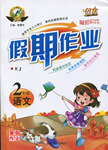题目内容
Well, you can buy $20 tickets or 30 $ tickets, ______ you prefer.
A.which B.whichever C.whatever D.what
B
解析:
考查状语从句。本题连词引导状语从句而不是定语从句,表示前面提到的两种票价的选择,用whichever引导状语从句。

 鸿图图书寒假作业假期作业吉林大学出版社系列答案
鸿图图书寒假作业假期作业吉林大学出版社系列答案To learn English well you must learn about yourself. You must discover what your own special needs are in English. You should pick o ut what makes English different from your own language and concentrate on those parts. And above all, you should pick out your own personal weaknesses in English, pick out your own special problems, find out what mistakes you most often make and make a list of them.
ut what makes English different from your own language and concentrate on those parts. And above all, you should pick out your own personal weaknesses in English, pick out your own special problems, find out what mistakes you most often make and make a list of them.
It will be best if, in your preparation, you can practise doing the various sorts of work you will be asked to do in examination. You should then make a careful note of any mistakes you make more than once. Count up how many times you make each mistake, and the mistake you make most oft en should be at the top of your list, the next most common in second place, and so on.
en should be at the top of your list, the next most common in second place, and so on.
For example, if your own language is Japanese, you may find the problem of articles comes at the top of your list. If you speak German, you may find using some of the conjunctions is your biggest problem. If your mother tongue is French, you find you are always having trouble with some of prepositions. And if Italian is your language, you may constantly forget to use a suitable pronoun when you should.
But these are only examples of mistakes typical of certain languages. They may or may not
be your particular personal mistakes. As I say, these personal ones are the most important of all to discover.
【小题1】
To learn English well the most important thing is to ______.
| A.learn about yourself as much as possible |
| B.discover your own special needs in the language |
| C.find out the difference between your own language and English |
| D.pick out your own personal weaknesses in English |
The writer advises the readers to ______ .
| A.spend as much time on English as possible |
| B.take examinations of various sorts |
| C.find out their own problems in doing selected exercises |
| D.keep a notebook with the important languages points in it |
The first item on the list should be the mistake you make ______ .
| A.more than once | B.many times | C.most often | D.very often |
Many of us already know about several American superstitions(迷信). Having a black cat cross your path, walking under a ladder, and breaking a mirror are all bad luck. In addition to these, there are many other superstitions that are worth knowing. Understanding them will keep you safe from evil spirits—if you believe in such things—and impress your American friends when you mention them.
Like the superstitions in other cultures, American superstitions often involve the things important in daily life, such as health, numbers, and marriage. For example, have you ever had a cough that would not go away? According to one American superstition, you should take a piece of your hair and put it between two slices of buttered bread. Next, feed this hair sandwich to a dog and say, “Eat well, you hound, may you be sick and I be sound.”This will trick the evil spirits and help your cough. It will also raise some eyebrows if you try it.
In American superstitions, the number three is very important. Often, Americans will say, “All things come in threes.” Three is lucky because it represents the traditional family: mother, father, and child. Therefore, gifts, letters, and guests will often arrive at your home in groups of three. However, it is also possible for bad events, like accidents and funerals, to come in threes as well.
Another time people pay attention to superstitions is when they get married. During a wedding, brides must wear or carry“something old, something new, something borrowed, and something blue.”The old and borrowed things will bring luck to the person who gives them to the bride. The new and blue things will bring good fortune to the bride herself. The next time someone you know is getting married, be sure to recite this phrase.
As it would be unlucky to discuss one more superstition, we will wind things up here. Keep your fingers crossed, and stay lucky!
1.The passage is most probably entitled(命名)“ ”.
|
A.American’s Bad Luck |
B.Cross-culture and Superstitions |
|
C.American Superstitions |
D.Daily Life in Superstitions |
2.The underlined sentence in the second paragraph“It will also raise some eyebrows if you try it”means: .
|
A.When you try it, the dog will raise its eyebrows |
|
B.You will make some people surprised when you try this trick |
|
C.Only if you raise your eyebrows can the trick work |
|
D.You will believe in the trick after you try it |
3.In American’s view, the number three is a(n) number.
|
A.lucky |
B.unlucky |
C.special |
D.ordinary |
4.On the wedding, the bride often uses old and borrowed things so as to .
|
A.save some money for the wedding |
|
B.bring good luck to the people who give them to the bride |
|
C.give the good luck to the bride herself |
|
D.pass the bad luck to others |